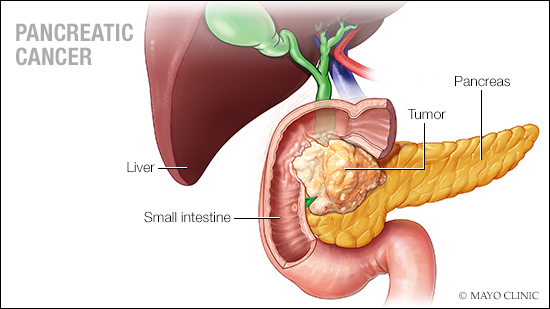-
Cancer
Science Saturday: Developing solutions for early detection of pancreatic cancer

Pancreatic cancer is one of the deadliest forms of cancer, but patients who are diagnosed at an early stage can survive five years or longer.
A team at Mayo Clinic is developing patient-centered solutions for early detection of pancreatic cancer using artificial intelligence and biomarkers.
This year, over 57,000 Americans will be diagnosed with pancreatic cancer, and 47,000 Americans will die of the disease, according to American Cancer Society estimates. More than 50% of patients with pancreatic cancer are diagnosed at a late stage, when the disease has spread beyond the pancreas.
Pancreatic cancer is challenging to catch early because most tumors don’t produce symptoms and elude diagnosis. There are no tests or tools for low-cost, convenient, safe and accurate screening.
Mayo Clinic researchers are creating an early-detection strategy to change that and transform patient care.
“As Mayo Clinic physicians and scientists it is our responsibility to purposefully innovate with a focus on improving outcomes for our patients, a shared responsibility to create the best-in-class care models for the future generation,” says Shounak Majumder, M.D., a Mayo Clinic gastroenterologist and pancreatologist.
Dr. Majumder and Gloria Petersen, Ph.D., a Mayo Clinic scientist and the Purvis and Roberta Tabor Professor, are leading the research team that is developing the early-detection strategy. Using multidisciplinary team science and artificial intelligence tools, the team will build state-of-the-art algorithms to systematically identify people at high risk for pancreatic cancer, and discover and validate novel imaging and molecular biomarkers for accurate early detection.
Systematic identification for high-risk patients isn’t available yet as a standard of care in clinical practice, but Dr. Petersen has shown that people with a family history of pancreatic cancer and those who are carriers of a predisposing gene mutation have higher risk, as well as people who develop new onset of diabetes mellitus later in life.
Read the rest of the article on Advancing the Science blog.
____________________________________________
Other Mayo Clinic medical research websites:
- Research at Mayo Clinic
- Discovery’s Edge
- Advancing the Science
- Forefront
- Mayo Clinic Center for Individualized Medicine
- Center for Regenerative Medicine
- Center for the Science of Health Care Delivery







